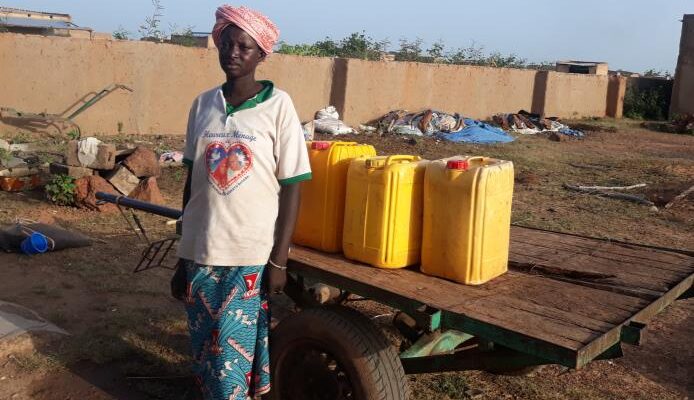In Burkina Faso, making clean water more accessible
Burkina Faso | 2022 | CBPF
Burkina Faso, Nouna. Dio Batoma is a 24, a mother of two and a person living with a motor disability that reduces her mobility.
She has been living in Nouna since insecurity forced her to leave her village in western Burkina Faso. The commune, home to some 15,547 IDPs, is located in the Boucle du Mouhoun region, which hosts 72,961 IDPs – 19.82 per cent of them women and 57.47 per cent of them children.
With growing demand on scarce water resources, many hosts and IDP households have difficulty accessing drinking water. According to a needs assessment conducted by Help and its partners in December 2021, more than 50 percent of the population in Nouna have difficulty accessing water, travelling long distances and enduring long waits to obtain the precious resource.
Accessing drinking water is all the more difficult for people with reduced mobility. “Before Help’s support, life was an ordeal for my children and I – problems with food, water, and money. For example, to get drinking water, we had to go to the fountain 2 km away and pay 25 CFA francs per 20-litre can,” says Mrs. Dio.
To ensure equitable and safe access to drinking water in this emergency context, Help trucked in water for 6,085 IDPs (3,061 women and 3,024 men). Each person received at least 7.5 litres of water a day for 30 days. Beneficiaries were targeted in an inclusive manner, taking into account gender and disability, among others.
In addition, awareness sessions on water, hygiene and sanitation (WASH) and gender-based violence (GBV) have already reached 6,200 people (3,210 women and 2,990 men).
These actions were carried out thanks to the Multi-sectoral Humanitarian Assistance Project for IDPs and host households in the communes of Bomborokuy, Nouna and Tougan, in the Boucle du Mouhoun region. They were implemented by Help and operated by the WU PAKUWE association, while the Regional Humanitarian Fund for West and Central Africa (RHFWCA) provided US$783,500 in financing.
“I benefited from the support of Help and its partners in September 2022 during the free distribution of drinking water and it relieved me a lot, even if only temporarily. There were also sensitizations on hygiene and cleanliness. All this helps us to preserve our health,” Mrs Dio said. “The water distribution allowed me to save the money I used to pay for water and to direct it towards another expense, in this case, to pay for food, even if it is not a large amount. The advice on hygiene also allowed me to clean up my living environment and to avoid certain diseases that could cause additional or unexpected expenses,” she added.
More information on the Regional Humanitarian Fund for West and Central Africa
OCHA – POOLED FUNDS DATA HUB – By Country (unocha.org)
https://crisisrelief.un.org/t/west-and-central-africa
